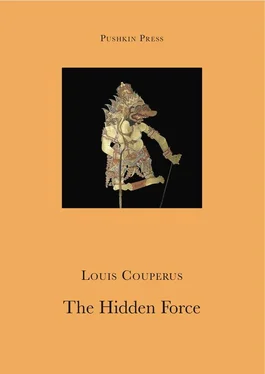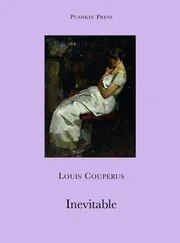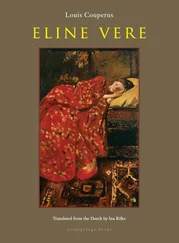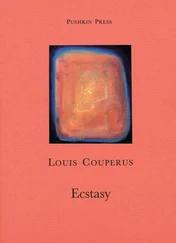Louis Couperus - The Hidden Force
Здесь есть возможность читать онлайн «Louis Couperus - The Hidden Force» весь текст электронной книги совершенно бесплатно (целиком полную версию без сокращений). В некоторых случаях можно слушать аудио, скачать через торрент в формате fb2 и присутствует краткое содержание. Год выпуска: 2012, ISBN: 2012, Издательство: Pushkin Press, Жанр: Классическая проза, на английском языке. Описание произведения, (предисловие) а так же отзывы посетителей доступны на портале библиотеки ЛибКат.
- Название:The Hidden Force
- Автор:
- Издательство:Pushkin Press
- Жанр:
- Год:2012
- ISBN:9781908968227
- Рейтинг книги:4 / 5. Голосов: 1
-
Избранное:Добавить в избранное
- Отзывы:
-
Ваша оценка:
- 80
- 1
- 2
- 3
- 4
- 5
The Hidden Force: краткое содержание, описание и аннотация
Предлагаем к чтению аннотацию, описание, краткое содержание или предисловие (зависит от того, что написал сам автор книги «The Hidden Force»). Если вы не нашли необходимую информацию о книге — напишите в комментариях, мы постараемся отыскать её.
The Hidden Force — читать онлайн бесплатно полную книгу (весь текст) целиком
Ниже представлен текст книги, разбитый по страницам. Система сохранения места последней прочитанной страницы, позволяет с удобством читать онлайн бесплатно книгу «The Hidden Force», без необходимости каждый раз заново искать на чём Вы остановились. Поставьте закладку, и сможете в любой момент перейти на страницу, на которой закончили чтение.
Интервал:
Закладка:
The Hidden Force is a story of decay, fear and disillusion. It takes place in Labuwangi, an imaginary region of Java. The writer’s vision of Dutch colonialism is that of a solid Dutch house, slowly crumbling in hostile, alien soil. The Dutch characters — even Van Oudijck, the chief local administrator, or district commissioner, of Labuwangi, initially so “practical, cool-headed, decisive from the long-term exercise of authority”—are defeated by the hidden forces of the land they rule. The nature of these hidden, or silent, forces is indistinct. It is not quite black magic, associated with Javanese mysticism, although that plays a part. Couperus, a Romantic of his time, believed in supernatural forces. He is quoted in E.M. Beekman’s illuminating introduction to his edition (see Translator’s Note): “I believe that benevolent and hostile forces float around us, right through our ordinary, everyday existence; I believe that the Oriental, no matter where he comes from, can command more power over these forces than the Westerner who is absorbed by his sobriety, business and making money.”
One character in the novel who commands such power (but power over little else) is Prince Sunario, the native aristocrat whose family had ruled the region for centuries. Van Oudijck detests him. Sunario is the heir to a long line of local sultans. The Dutch administration kept these nobles on as vassal rulers with colourful ceremonial trappings, and some administrative duties, such as tax-collecting. Van Oudijck, an “ethical” administrator, respected Sunario’s father, a Javanese of the old school, but sees Sunario as “degenerate, a demented Javanese dandy”, a “mystery, that wayang shadow puppet”, gambling and indulging in native hocus-pocus. Sunario, for his part, views the Dutchman as a crude, base, foreign infidel, who has no business upsetting the sacred bonds and privileges of ancient aristocratic rule.
Couperus, in this book at least, is in no way an apologist for colonial rule. Quite the contrary. His descriptions of Van Oudijck’s priggish love of order, hard facts and hard work, and the same man’s patronizing view of natives and contempt for half-castes, so typical of Dutch colonial administrators, are full of mocking irony. Van Oudijck’s disdain for the Eurasians is not always personal. His first wife had Javanese blood, and he loves his two children, even though his daughter, Doddy, looks and speaks like a typical Indo-European. It was the idea of the “Indo” that Van Oudijck cannot abide — the idea of something less than pure. Van Helderen, a Creole born in the Indies, warns the Dutch wife of a civil servant that the native population, “oppressed by a disdainful overlord”, is likely to revolt at some point. He sounds remarkably prophetic. She, Eva Eldersma — a bored, artistic Dutch woman trapped in the colonial life — had sensed something foreboding in the air. She thinks it is the strangeness of the landscape, the climate, the people, whom she doesn’t understand. And he says to her: “You, being an artist, feel the danger approaching, vaguely, like a cloud, in the air, in the tropical night; I see a very real danger arising — for Holland — if not from America and Japan, then from the soil of this land itself.”
There is no doubt that Couperus felt the danger on his travels through Java. And remember, this was written when Dutch power was unassailable. But Couperus was not a prophet. So a vague sense of unease, of something being out of kilter, must have been palpable. There must have been a feeling, among at least some of the Dutch, of walking on treacherous ground, which could suck you in, however sturdy your big Dutch boots might be. To describe this feeling as guilt would be wrong and anachronistic. It might have been closer to a sense that the Europeans had bitten off more than they could chew, or a nagging awareness of the hollowness
of their bluff. Van Oudijck resists such feelings until near the end of the book, when he, too, is defeated by the silent forces of the East, forces manipulated, perhaps, by his opponent, the puppet-like Sunario. The struggle between the two men is a struggle between two types of power: one is supposedly rational, open, bureaucratic; the other is magical, shadowy, mysterious. The hidden force of Sunario is associated with the night, with moonlight, while the power of the District Commissioner is exercised mainly in daylight. As Beekman points out in his introduction, the District Commssioner’s ceremonial sunshade, or pajong , is often described as a “furled sun”.
One is reminded of V.S. Naipaul’s descriptions of Trinidad, where the black plantation slaves would turn the world upside down at night. Then, hidden by the dark, they would call up half-forgotten remnants of African magic to transform their abject existence as slaves into a glorious parallel world of kings and queens. Naipaul describes this as a pathetic fantasy, and Couperus writes about the hidden force as something quite real. But both writers, like Conrad, are sensitive to the horror that lies behind it.
The conflict between Van Oudijck and Sunario comes to a head when the behaviour of Sunario’s brother becomes impossible. He gambles and drinks, and instead of efficiently carrying on his tax-collecting and other duties, steals money from the treasury to pay his debts. The District Commissioner decides to take the unprecedented step of dismissing him, which would mean a frightful loss of face for an ancient noble family. The Prince’s mother, a princess, is so outraged that she throws herself at the District Commissioner’s feet and offers to be his slave, if he could only forgive her son. But Van Oudijck stands firm. He cannot afford to compromise. Principle is principle. A decision, once taken, must not be revoked. For he “was a man with a lucid, logical, simple, male sense of duty, a man of the clear, simple life. He would never know the forces lurking beneath the simple life and together constituting the almighty silent force. He would have scoffed at the suggestion that there are peoples who have more control of that force than Westerners.”
Then horrible things start to happen. The District Commissioner’s young wife, Léonie, as promiscuous as she is narcissistic, finds herself being spat on with blood-red sirih (betel juice), apparently from nowhere, as she stands naked in her bath. (Couperus’s description of slimy splatters dribbling down her breasts, her belly and her buttocks shocked his Dutch readers; in the original English translation such passages were bowdlerized.) Malevolent spirits stalk the district commissioner’s mansion. Stones sail through the rooms. Sinister figures in white turbans appear and disappear, like ghosts. Glasses shatter, whisky turns yellow. The District Commissioner’s family leaves the haunted mansion in terror. Even his servants flee from the house. But the District Commissioner stays put, working on his papers, ignoring the noises, the broken glass, the soiled beds, the hammering overhead. He has these disturbing events investigated, “as punctiliously as he would have done in a criminal case, and nothing came to light”.
The District Commissioner and the Prince come to a kind of agreement in the end — what agreement, the reader never knows — and the torments stop, but, like Dutch supremacy itself, the District Commissioner’s authority begins to disintegrate even as it reaches its peak. And, again as was the case with the Dutch colonialists, the subversion, the fatal loss of nerve, occurs inside the ruler’s own heart.
Van Oudijck had ignored his wife’s sexual adventures, even though everyone else knew about them. He had been blind to her affairs with his half-caste son — her stepson — and with a handsome Eurasian boy called Addy, even though regular hate mail pointed these things out to him. He had not been aware of the jealousies that soured the air in his residency. But, now, suddenly, after he had resisted the hidden forces through sheer force of will, the tropical poison began to sap his spirit too. For the first time in his life the District Commissioner felt the pangs of hatred and jealousy and he became superstitious, too, “believing in a hidden force, hidden he knew not where, in the Indies, in the soil of the Indies, in a deep mystery, somewhere, somewhere — a force that meant him no good, because he was a European, a ruler, a stranger on this mysterious, sacred shore”. The moonlit Javanese night had exacted its revenge.
Читать дальшеИнтервал:
Закладка:
Похожие книги на «The Hidden Force»
Представляем Вашему вниманию похожие книги на «The Hidden Force» списком для выбора. Мы отобрали схожую по названию и смыслу литературу в надежде предоставить читателям больше вариантов отыскать новые, интересные, ещё непрочитанные произведения.
Обсуждение, отзывы о книге «The Hidden Force» и просто собственные мнения читателей. Оставьте ваши комментарии, напишите, что Вы думаете о произведении, его смысле или главных героях. Укажите что конкретно понравилось, а что нет, и почему Вы так считаете.












